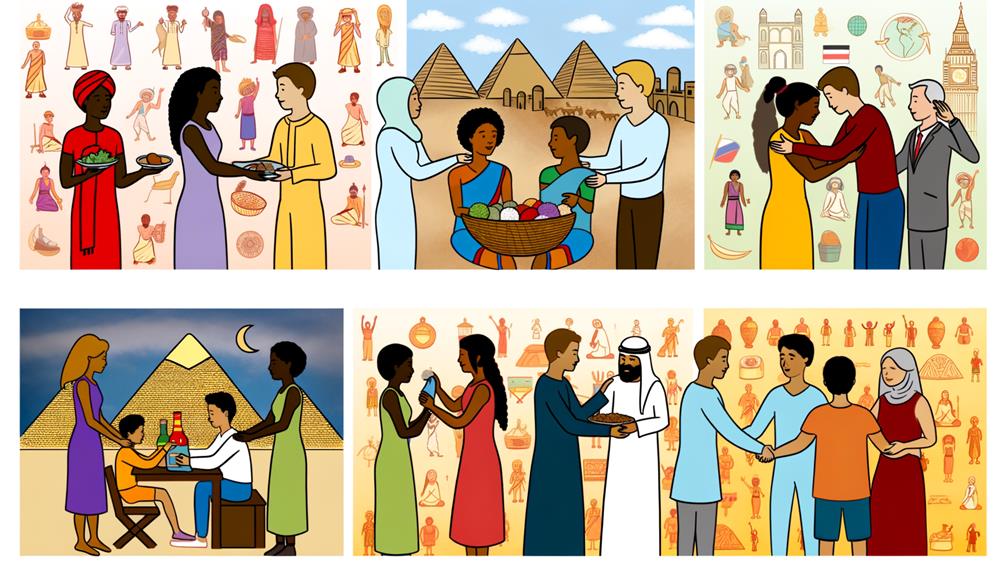Do Unto Others Bible Verse Meaning: Compassion and Kindness
The phrase ‘Do unto others as you would have them do unto you,’ articulated in Matthew 7:12 during the Sermon on the Mount, embodies an ethical axiom central to Christian doctrine and resonant across various religious and philosophical systems. This principle underscores reciprocal altruism, advocating empathy, and justice by urging individuals to treat others with the respect and kindness they themselves desire.
It serves as an ethical linchpin aligning with Jesus’ teachings on love and compassion, while its universal appeal spans cultural and historical contexts, suggesting profound implications for understanding communal harmony and the interdependence of human relationships. Further exploration reveals deeper dimensions and applications of this profound moral edict.

Do Unto Others Bible Verse: Meaning and Practical Insights
| Verse | Scripture | Meaning |
|---|---|---|
| Matthew 7:12 | “So in everything, do to others what you would have them do to you.” | Known as the Golden Rule, it teaches treating others as you wish to be treated. |
| Context | Jesus’ Sermon on the Mount | A call to live with love, fairness, and empathy. |
| Application | Relationships, work, and daily actions | Encourages kindness, compassion, and respect. |
| Related Verses | Luke 6:31, Galatians 5:14 | Reinforces loving your neighbor as yourself. |
| Spiritual Insight | Reflects God’s character and love | Living this way honors God and promotes harmony. |
Biblical Context

The phrase ‘Do unto others as you would have them do unto you,’ often referred to as the Golden Rule, appears prominently in the teachings of Jesus, specifically within the Sermon on the Mount as recorded in the Gospel of Matthew (7:12).
This directive encapsulates a fundamental ethical principle that transcends religious boundaries, emphasizing reciprocal altruism.
In its biblical context, the Golden Rule serves as a summative statement of the Law and the Prophets, inviting followers to align their actions with the essence of divine commandments.
By situating this precept within the broader narrative of Jesus’ teachings, it underscores a universal moral framework that promotes empathy, compassion, and justice.
This holistic approach fosters a deeper understanding of communal harmony and personal integrity.
Historical Interpretations

Throughout history, the Golden Rule has been interpreted and applied in various ways by different cultures and religious traditions, reflecting its enduring significance and adaptability.
In ancient Greece, philosophers such as Socrates and Plato emphasized reciprocal ethics, which align closely with this principle.
Confucianism, predating Christianity, advocates a similar maxim articulated by Confucius as ‘Do not do to others what you do not want done to yourself.’
In Judaism, Rabbi Hillel the Elder succinctly encapsulated the Torah by stating, ‘What is hateful to you, do not do to your neighbor.’
These diverse historical interpretations underscore the universal moral foundation shared across cultures, demonstrating the rule’s profound impact on ethical thought and human behavior throughout millennia.
Theological Insights

Exploring the theological insights of the Golden Rule reveals its profound doctrinal implications and its integral role within Christian ethical teachings.
This principle, encapsulated in Matthew 7:12, underscores the interdependence of divine commandments and human relationships.
Theologically, it reflects the imago Dei, the belief that humans are created in the image of God, hence deserving of mutual respect and dignity.
Additionally, it aligns with Jesus’ summation of the Law and the Prophets, highlighting love and empathy as foundational to Christian morality.
The Golden Rule’s emphasis on reciprocity and altruism challenges believers to transcend self-interest, embodying Christ-like love.
It serves as a critical ethical touchstone, fostering community and reinforcing the inherent value of every individual.
Cultural Impact

Beyond its theological significance, the Golden Rule‘s cultural impact demonstrates its pervasive influence on social norms and ethical frameworks across diverse societies.
This ethical maxim has transcended religious boundaries, embedding itself within secular moral philosophy and legal systems globally. It promotes empathy and reciprocity, foundational to social cohesion and justice.
Anthropologists and sociologists note its presence in various cultural codes, from Confucianism’s ‘Do not impose on others what you do not wish for yourself’ to the African Ubuntu philosophy emphasizing communal interdependence.
This universality suggests an intrinsic human inclination toward mutual respect and ethical reciprocity.
Consequently, the Golden Rule fosters global ethical consistency, illustrating its role as a cornerstone in the development of a collective moral conscience.
Modern Relevance

The ethical principle embodied in ‘Do unto others’ remains profoundly relevant in contemporary society, informing everyday ethical choices and fostering community cohesion.
By encouraging empathetic and reciprocal actions, this biblical axiom serves as a foundational guideline for interpersonal interactions and communal practices.
Its application in modern contexts underscores its enduring significance in promoting moral responsibility and social harmony.
Everyday Ethical Choices
Incorporating the principle of ‘Do unto others as you would have them do unto you’ into everyday ethical decisions necessitates a nuanced understanding of both empathy and moral reciprocity in contemporary contexts.
This axiom, rooted in the Golden Rule, demands active engagement in the subjective experiences of others.
For example, in workplace dynamics, it encourages equitable treatment, fostering mutual respect and cooperation.
In consumer behavior, it advocates for ethical consumption and corporate responsibility.
The principle extends to digital interactions, where online civility and integrity are paramount.
By internalizing this ethical framework, individuals navigate moral dilemmas with a balanced approach, promoting societal harmony.
Consequently, this timeless tenet serves as a compass, guiding modern ethical choices with profound relevance.
Community Building Practices
A robust understanding of ‘Do unto others as you would have them do unto you’ can greatly enhance contemporary community building practices by fostering empathy, cooperation, and mutual respect.
This principle, grounded in reciprocity, encourages individuals to reflect on the experiences and needs of others, promoting social cohesion. Scholarly perspectives suggest that such ethical frameworks can mitigate conflicts and enhance collaborative efforts in diverse groups.
By integrating this ethos into community initiatives—such as local governance, educational programs, and social services—stakeholders can create inclusive environments that support the well-being of all members.
Consequently, this biblical tenet remains profoundly relevant, offering a timeless guide for nurturing harmonious and resilient communities in the modern era.
Practical Applications

The principle of ‘Do unto others’ manifests in everyday acts of kindness, which can greatly contribute to the fabric of strong, cohesive communities.
By fostering an environment where empathy and respect are paramount, individuals not only enhance interpersonal relationships but also create a ripple effect that promotes societal well-being.
These practical applications underscore the transformative power of this biblical tenet in contemporary life.
Everyday Acts of Kindness
Engaging in everyday acts of kindness serves as tangible expressions of the principle ‘Do unto others,’ fostering a more compassionate and empathetic community.
Simple gestures, such as holding the door open, offering a seat, or lending an attentive ear, embody this ethical directive.
These acts, seemingly modest, have profound psychological impacts, both on the giver and the receiver, promoting well-being and mutual respect.
Research indicates that kindness can elevate mood, reduce stress, and even enhance longevity.
Additionally, these actions create a ripple effect, encouraging others to act kindly, thereby perpetuating a cycle of goodwill.
Building Strong Communities
Incorporating the principle of ‘Do unto others’ into community initiatives can greatly enhance social cohesion and collective resilience. This ethos encourages mutual aid, fostering an environment where individuals support one another based on shared values of respect and kindness.
Practical applications include community service projects, neighborhood watch programs, and inclusive public forums. Such initiatives not only address immediate needs but also build trust and interdependence among community members.
By prioritizing empathetic actions and equitable resource distribution, these efforts contribute to a robust social fabric. Additionally, this principle underpins conflict resolution mechanisms, ensuring that disputes are managed with fairness and understanding.
Consequently, communities grounded in this ethical framework are better equipped to navigate challenges and thrive collectively.
Promoting Empathy and Respect
Empathy and respect can be effectively promoted through structured educational programs and community-based workshops that emphasize active listening, cultural sensitivity, and emotional intelligence.
Such initiatives foster environments where individuals can practice understanding others’ perspectives, thereby translating the Biblical principle of “Do unto others” into actionable behaviors. These practices encourage empathy and compassion, reinforcing the idea that we are called to not only consider our own needs but also those of our neighbors. By actively engaging in these behaviors, individuals learn to “go the extra mile meaning” that true kindness often requires us to exceed basic expectations. Ultimately, these initiatives cultivate a sense of community and support, inspiring people to create a more harmonious society.
Research indicates that these programs enhance interpersonal relationships and reduce conflicts.
By integrating role-playing exercises and reflective discussions, participants can develop deeper emotional awareness.
Additionally, culturally diverse settings provide opportunities to challenge stereotypes and build mutual respect.
As these skills become ingrained, they contribute to more inclusive and harmonious communities.
Consequently, the practical application of empathy and respect not only aligns with Biblical teachings but also fortifies social cohesion.
Conclusion
The biblical precept ‘do unto others’ serves as an ethical cornerstone, echoing through history and shaping moral frameworks across various cultures.
Its theological implications underscore the essence of empathy and reciprocity, akin to a golden thread weaving through the fabric of human relationships.
Contemporary relevance is undeniable, offering timeless guidance for interpersonal conduct.
Ultimately, its enduring legacy affirms the universal aspiration for a just and compassionate society, transcending temporal and cultural boundaries.






